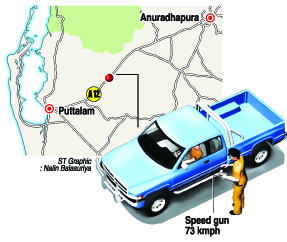News
Motorist wins 4-year case over ‘alternative’ charge
A company director charged with reckless driving after being stopped by traffic police for speeding has been exonerated following a four-year battle in the courts over whether a person can be arrested for one offence but charged over another.
Kanchana Dissanayake, 34, was cleared of all charges by Puttalam Magistrate Ranga Dissanayake.
Magistrate Dissanayake cleared him over the charge of exceeding the speed limit in accordance with a 2008 Supreme Court order that prohibited police from filing speeding charges where authorities had not erected signboards indicating speed limits in specfic areas.
The magistrate also dismissed charges of dangerous and reckless driving in accord with Motor Traffic Act regulations and as the police failed to produce adequate evidence to support the charges.
Saliyawewa police charged the defendant for exceeding the speed limit and dangerous and reckless driving in the Mahahenyaya area on May 11, 2012.
Police showed the reading on the speed gun, 73kph, to the motorist. It was subsequently found that the same reading had been presented to the motorist pulled over a little earlier, so Mr. Dissanayake rejected the reading as being genuine.
The case was heard by the then Puttalam magistrate, Heshan de Mel, on May 22 that year and committed for trial as requested by the lawyers of the defendant. The defendant was released on bail.
At trial under Magistrate Dissanayake, police informed the court that they were acting upon a circular (CTRM 305) issued by the Office of the Inspector-General of Police, attached with a memorandum dated 2009 (MTA/601/2009) from the Attorney-General. This, police said, allowed them to use the speed gun reading as evidence for a charge for dangerous and reckless driving instead of the previous charge of exceeding the speed limit.
Magistrate Dissanayake ruled that CTRM 305 issued by the IGP clearly violated the order given by the Supreme Court that banned speeding charges where there were no speed limit signs. Hence, CTRM 305 was illegal, the magistrate said.
He held that in addition to being illegal the circular violated a citizen’s basic rights: it was clear, he said, that the defendant had been charged with a different offence because he had refused to accept that he had committed the offence of speeding.
“It is clear that the charges were aimed at bringing pressure on the person concerned,” the magistrate said.
The defendant was entitled to be compensated for the losses sustained during the trial, the court ruled. Saliyawewa’s former OIC, Inspector D.P.K. Abeynayake, has been given time to raise any objections regarding the entitlement to compensation.
Police should smarten up their act, say critics
Sri Lanka Bar Association Secretary, Ajith Pathirana criticised police law enforcement agencies for being incapable of interpreting laws under the Motor Traffic Act, thus creating disputes between police and motorists.
He told the Sunday Times police should develop valid mechanisms to prosecute violators without providing baseless evidence and facts to courts.
Mr. Pathirana also said the public should take greater interest in understanding and obeying road rules and not risk lives in the way they drove vehicles. Motorists should also only challenge law enforcement institutions for justice, not for personal gain, he said.
Ceylon Automobile Association Secretary D. Hettiarachchi alleged that some police prosecuted motorists in revenge for being challenged over charges.
He implied that 50-60 per cent of police traffic officers have failed to perform their duties properly.
Consumer Rights Protection National Organisation President Ranjith Withanage said three-wheeler drivers experienced the greatest discrimination in the imposition of fine and charges under traffic laws.
Mr. Withanage agreed that most three-wheeler drivers had limited knowledge of traffic regulations but said police should take initiatives to conduct awareness programmes and should also revise certain regulations that would allow three wheeler drivers to drive with a certain level of freedom while keeping to the law.

